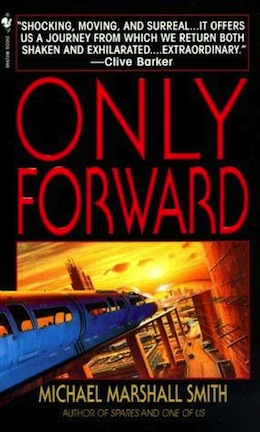This probably isn’t the best place to admit I haven’t read enough science fiction. But while I grew up with SF in other media—The X-Files and Gerry Anderson reruns were my childhood staples—I hardly ever delved into the back catalogue of SF literature.
Which meant by the time I hit my late teens, I had some catching up to do.
Michael Marshall Smith’s Only Forward was one of the first “modern” SF novels that made a big dent in me. Looking back, it was also the book that made me want to write SF.
My introduction to this brilliant novel wasn’t unusual: a good friend handed me the paperback with the words, “You’ll like this.” And they weren’t wrong. I started reading it on a four-hour train journey, then sat in a café at the other end to plough on for another couple of hours before I even thought about going to catch my local bus home.
Over a decade later, I’m struggling to think of many books that have had such an addicting, profound effect on me. And that’s why it’s hard to pinpoint a single line or moment that makes Only Forward so special.
For starters, you’ve got Stark, the novel’s noirish, unreliable narrator. He’s a future-PI with a pottymouth, and his glib wryness and occasional fourth wall-breaking give the story a real energy, not to mention a bleak sense of humor. Stark’s voice is weary, sardonic, and wonderfully British—check out the early pokes at his clients’ “can-do” corporate bullshit for an idea of where he’s coming from. He’s good company, and he knows it.
Then there’s Smith’s riot of ideas: talking appliances, gravity-altering gadgets, hangover-depleting drugs. The book’s setting, too, is wonderfully distinctive—a multitude of interconnected but distinct Neighbourhoods that comprise the City. Like Colour, whose computer decides the environment’s palette according to your mood. Or Cat Neighbourhood, left a mess by humans but made strangely immaculate by its feline inheritors.
And then again there’s the book’s second half: a slide into something altogether weirder, even more inventive, complete with a surprising tonal shift. In part two we depart from a pacey future-thriller and head to Jeamland, Only Forward’s trippy otherworld, on a strange and sometimes harrowing journey.
If I really had to pick out one thing, it would be this segue. Because it’s here, as we go to Jeamland, that Only Forward reveals something magic: a glimpse of its writer at play. It’s almost like the dreamy qualities of this fantasy land allow you to see Smith imagining and reimagining things as he goes. And you just know he’s having a great time.
For me, someone only just considering writing as a hobby to pursue, it was exciting, even inspirational, to recognize the budgetless freedom of this section. I admired Smith for doing what he wanted, exactly how he wanted to do it. And on that long train journey, realizing that you could have fun while writing a novel came as a bit of a revelation.
Today, of course, with more SF read (and a little bit written), it’s hard for me to revisit Only Forward without wanting to analyze the book on a technical or stylistic level. But occasionally, just occasionally, I can go back—albeit with a sadness that I’ll never again read it with fresh eyes—and still channel that excitable sense of freedom. Simply, Only Forward is a lovely reminder of not only what you can do with science fiction, but what science fiction does best. And yep, it is awesome.
Matt Hill grew up in Tameside, Greater Manchester. After completing a journalism degree at Cardiff University, he trained as a copywriter. He now lives and works in London. His first novel, The Folded Man, was runner-up in the 2012 Dundee International Book Prize. His novel Graft is out February 2nd from Angry Robot. You can find Matt on Twitter @matthewhill.










